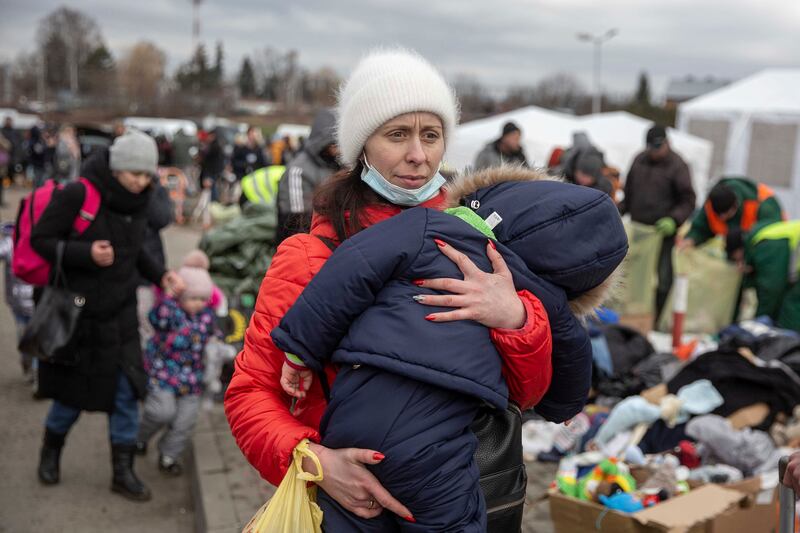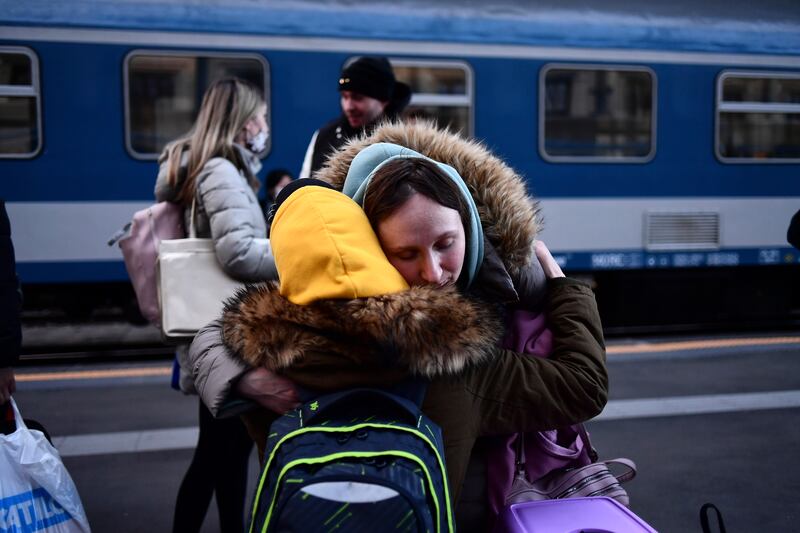As Russia’s attack on Ukraine dominates the news and social media feeds, parents are wondering how — or if — they should talk to their children about the invasion.
The answer is simple for very young children, up through about age 5, according to parenting experts. Unless young kids directly ask, which is unlikely, there’s no benefit to discussing the conflict, they said.
For older kids, though, the likelihood is someone will bring it up even if parents don’t. And children are best served by having a discussion with their folks, several experts told the Deseret News.
“If they start to hear it from others, that can be really scary if parents haven’t already approached that subject with them,” said Dee Ray, a professor of early childhood education at the University of North Texas and director of its Center for Play Therapy. “Most children do go out into the world and you wouldn’t want them to hear from friends or other very anxious adults first.”
Laurie Singer, a licensed marriage and family therapist in Camarillo, California, who is board certified in applied behavior analysis, said that “one of the most important jobs as parents is to help our children feel safe and listened to.”

Deepening stress
The pandemic has already created uncertainty and events in Ukraine could exacerbate stress, Singer noted.
“Without the experience to understand context and nuance as well as most adults, a child’s imagination can play a significant role in hyperfocusing on anxiety-provoking problems,” she said. “So it’s imperative that parents communicate with their children in a way that helps them stay calm.”
Similarly, Ray pointed out that children are “great perceivers and poor interpreters.” They see things but don’t know what it means, so adults need to talk them through it.
Understanding a child’s developmental age is crucial to having the right conversation, according to Sam Goldstein, psychologist and adjunct professor of psychiatry at the University of Utah.
“You can do more harm by trying to talk to a 6-year-old about stuff they don’t understand — or trying to talk to a 15-year-old like they are 6 years old,” he said.
Goldstein, co-author of “Raising Resilient Children,” said it’s a good idea to ask children if they’ve heard anything about Ukraine and what they have heard. “Rather than waiting to start a conversation, find out what they already know,” he said, and correct inaccurate information if it’s not too complicated. “Sometimes you just have to say, ‘I don’t think that’s right.’”
Talking about war, even when it’s far away, is a serious discussion that requires undivided attention so that children can ask questions and feel that they are safe and are being heard, Singer said.
“If it’s a busy time and an issue will require some more in-depth conversation, then set a time and let the child know you’ll be able to sit down and discuss it with them then,” she said. Don’t gloss over the conversation or rush through it because the topic’s unpleasant.

Check yourself
Parents must consider their own response to the situation because that will impact their child’s perspective, said Lisa Bahar, a licensed psychotherapist in Newport Beach, California, who’s studying for a doctorate in global leadership and change at Pepperdine University.
“The words you say as a parent will be replicated in the settings they are exposed to, whether school, activities or outside friend groups,” she said.
Other experts echoed her advice that parents pay attention not just to their children’s media exposure, but to their own. Singer is among the counselors who noted that children aren’t the only ones who feel anxious about world news. Adults can be very unsettled, too.
“Be mindful of what news you’re watching with your child present or that they might be able to hear,” said Singer. “As always, we need to pay attention to what our children are watching or listening to on social media as well as television.”
Bahar suggested that parents attend school board or other meetings and ask how teachers are being trained to talk to students about troubling world events, then consider how they feel about the approach. “The key here is to consider consistent messaging so the child is getting clear messages from the areas they are influenced by,” she added.
It’s also important to think about what neighbors, friends and others are saying and how — or if — a parent believes it warrants a response. The goal is not to judge, but to accept and understand while agreeing or disagreeing, Bahar said.
For those who find faith “a place of safety and communication,” it’s helpful to discuss with religious leaders or prayer groups the godly approach to how to speak with children, she said.
The discussion
Experts agreed that parents should definitely be talking to children 8 and older. But the child’s developmental age should drive the conversation.
Younger than about age 10, children worry most about how they or those close to them will be impacted by whatever’s happening. So reassurance is important.
For older kids, parents can talk about what the kids can and cannot control in a situation.
A child’s questions can guide the level of detail. A parent can be far more detailed with a child who’s 14 or 15, perhaps exploring the political thinking involved in both the invasion and the response.
Ray acknowledged that America’s political divisions are very hard because “we want to be able to tell our children that we have leaders who are helping try and figure this out and trying to save people and keep war from happening and we should be able to trust our leaders.”
For parents of younger kids, especially, she said she hopes parents will put aside political differences and reassure their children, who need to feel safe about a situation over which they have no control.
Goldstein emphasized this invasion is not a single event, but something that is unfolding and hard to sort out from far away.
“You turn on the news and it’s really hard to get a feel for what exactly does it mean. They show pictures of a city that looks fine. Then they show pictures of a car that exploded or a building that had part of it knocked out,” he said.
He recommended that parents manage their children’s media exposure, which can be psychologically overwhelming because it “bombards you” all day long.
Parents often default to reassuring children, said Goldstein. A kid comes home and says he doesn’t have friends at school and parents rush to assure him he does have friends. It might be more helpful to ponder with the child ways to make friends, but that’s not an instinctive response. That same protective instinct could lead parents to gloss over what’s happening in Ukraine. Goldstein said parents should be truthful, but not graphic about Ukraine.
Wrong information is worse than no information, he added. But Goldstein said some aspects of this unfolding story are hard to explain. You can’t see an economic sanction, but you can see a rocket. It can be confusing for children who ask what countries like the United States are doing.
If a child asks a question about the Russian attack that you can’t answer, say so, but tell them you’ll look into it. Then do so, Singer said.
“Sharing what you learn at a level they’ll understand can go a long way in letting them know their thoughts are valid,” she said.
Parents may want to write out a script for themselves, said Ray, so they don’t inadvertently make what’s happening even more frightening for kids. Having talking points can be good.
It’s also helpful to get a map and show children where Ukraine is — and how far away it is.
Stress and the power to help
The experts said parents should watch for signs of anxiety and distress, paying attention as well to sleep patterns, whether a child has nightmares, media consumption habits and physical symptoms of distress like stomach aches or headaches. Talking more than usual or less than usual can also signal anxiety.
If the child is in severe distress, parents should consider getting professional help, Goldstein said.
Children need to know that they’re safe and their loved ones are safe before they can even think about other people being hurt in other countries, he said. But most children are empathetic and do want to help other children.
Singer said parents should consider how they, along with their children, can help — through a charity, a church group or other nonprofit. “Taking action can be very empowering and provide a child with a sense of strength and compassion,” she said.
Helping the child find ways to help not only reduces a feeling of powerlessness, but it also helps raise good citizens, she said. And helping others together can strengthen the parent-child bond.
Ray warns against portraying groups of people as all good or all bad.
“We want to make sure our children know that there are children in Russia just like them and children in Ukraine that are just like them and not try to make it that the entire country in Russia is doing this bad thing,” she said, noting that there are people who are risking their lives in Russia to protest the invasion.


